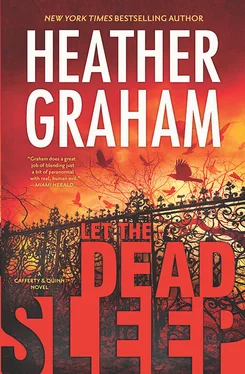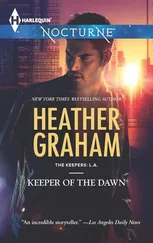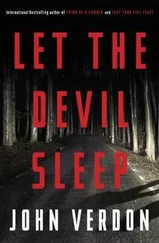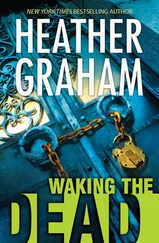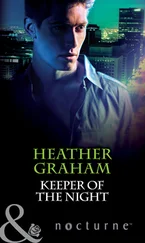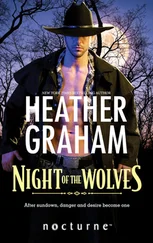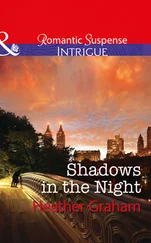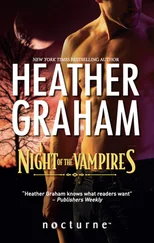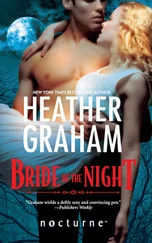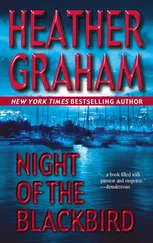“The bust is a thing,” Danni said. “Yes, it was stolen. Yes, it belongs to the estate. But it’s a thing. Just a thing.”
“You really have no idea what your father did, do you?” Quinn asked her.
“I gather he helped the police at times,” she said. “And no, I didn’t know. And although I guess it would be to the estate’s benefit if the bust was found, it can’t be that important. It was stolen to begin with, right?”
“It’s got quite the history. The bust dates back to the Italian Renaissance. I know some of the background, but not all of it. It graced the tomb of a contemporary of Lorenzo de’ Medici’s. It remained there, bringing bad luck to the family, or so I’ve read—until World War II, when it was stolen. According to oral history, it was taken by a supporter of Mussolini who gave it to a German general as a gift. Both men committed suicide. Naturally, it was suggested that they did this because the war crimes they’d carried out were horrendous—and they were afraid that if they were taken in the night by the Russian forces, they’d be tortured before they were killed. From there, the bust supposedly wound up with Hitler himself. After the war, it found its way into the home of a Soviet KGB officer, after which it disappeared until it was unearthed by an American sculptor who smuggled it into the United States. He went on to become a serial killer. His name was Herman Abernathy and he drained the blood of five women in order to make perfect statues of them. The bust went up at an auction house when his estate was sold to pay for his defense and it was bought by a New Orleans entrepreneur and voodoo practitioner. He didn’t buy it for his own estate. He had it placed in the cemetery over the tomb of a family known to have practiced white magic. I assume he believed that the dead who were powerful in the ways of good could control the evil in the statue. Then came the summer of storms, the bust disappeared and people started winding up dead.”
“Those killer storms are a number of years behind us now,” Danni said.
He nodded. “The bust was returned to the cemetery. There was a write-up about its odd history in the Times Picayune not long ago.”
“I remember the article—but just vaguely,” Danni admitted.
“Then it was stolen again. The thief was killed by a junkie, who in turn massacred a bunch of other junkies. He’s awaiting trial now. He sold the bust to Hank Simon right before he was nabbed by the police. And you know what happened after that.”
“How did a man like Hank Simon meet up with a junkie?” she asked.
“Hank was a collector. Vic Brown knew that. No killing had been connected to the bust at the time—and Hank was willing to buy a great piece even if he suspected it hadn’t been gotten legally. You know how much buying and selling goes on outside the law!”
“That’s irrelevant. Anyway, it’s a thing,” Danni repeated.
“Fine. Well, then, thank you very much, Ms. Cafferty, for taking the time to help out here.” Quinn thrust a hand into his pocket and produced another card. “Here, if you feel you really want to understand what your father did, call me sometime. I’ve got to get on with the search for that...thing.”
He left her standing on the sidewalk and hurried to his car. He realized she was disturbed by the events of the day and was fighting the possibility that the bust itself could be evil. That was understandable. But...
Why hadn’t Angus talked to her about the shop?
Maybe, for Angus, separating his life with his daughter—his family—from the shop and his calling had been a method of clinging to something normal.
As he got into the driver’s seat, he saw that she was still standing on the sidewalk, watching him.
She stood tall beneath the moonlight, hair curling over her shoulders, and she gave the impression of an Athena—someone who was strong and ready to face the world in defense of the innocent.
He shook his head, emitting a sound of derision.
Yeah. Big help she was.
Then he took a deep breath. Not fair, Quinn.
He thought about his own past. You didn’t know until...
You knew.
He’d been reprehensible before he’d learned the truth; she was merely ignorant.
But like it or not, he might be moving forward on his own.
With that in mind, he pulled out into the street. Time to hit a few of the shadier spots in the city of New Orleans.
* * *
The bastard.
The arrogant, crazy, single-minded bastard.
Danni watched Quinn drive away, her emotions raging. She was furious. It was late—and he’d just left her on the street, going off on his own.
Not that she’d wanted to go anywhere with him. But he’d dragged her into this, and now she felt guilt and sadness that a woman was dead—and total confusion. People could behave brutally, badly, cruelly. But he was obsessed with an object!
As far as she could see, the damage was done. Hank and Gladys Simon were both dead; the bust—the thing that had driven Gladys so crazy—was gone. Stolen. But surely the bust itself didn’t have any power. Power lay in the minds of people. Somehow Gladys had let herself believe the bust was evil, and therefore, in her particular reality, it was.
“Jerk!” she said aloud.
She headed for her own car in the dark.
As she drove home, she wondered how her father had come to know police officers and forensic experts—without her having a clue. Granted, she and Angus hadn’t been joined at the hip. Although she had her room in the shop, where she’d been staying since his death, she’d also had an apartment near Tulane, which, of course, she’d now let go. She’d grown up in the French Quarter, and leaving the sometime-insanity of the area for a place of her own had seemed a logical progression for her. She loved her art, fellow artists and a number of musicians. She went out with her friends; her father went out with his.
She’d just never imagined him delving into police matters. Knowing that Quinn person.
“Jerk,” she said again.
She bit her lip as she turned down Royal Street. She was hurt, too. Hurt that so much had gone on that she hadn’t known about. She reminded herself that she’d hidden a few things from her father while growing up—not terrible things, but she’d had her share of normal escapades in college. There’d been a few dates she certainly hadn’t wanted to share with him, and yet...
In all important matters, they’d been close. He’d been friends with Jarett Morrison, the love of her high school life, and although she and Jarett had split up in college, they’d somehow stayed best friends. Her father had been her rock when word had come that Jarett had been killed on a dusty desert road by a bomb while in the service; he’d held her through the funeral. He’d never met Aaron, the wacky engineer she’d dated for only a few months, or Hardy Wentford, the forlorn guitarist. She’d never brought a man home to meet Angus unless she was serious about him, and she hadn’t felt that way about anyone since her mad high school crush on Jarett, a crush that had just faded, as naturally as aging.
Lately, since before her father’s death, she hadn’t even met anyone she really wanted to have coffee with, much less get serious about.
The point was that she’d hidden a few questionable dates; he’d hidden an entire life’s project!
Royal Street was quiet but she could hear the distant, competing music from Bourbon Street—like the beating of the French Quarter’s heart. The real heart, of course, wasn’t in the blaring pop music, the strip clubs or the bars on Bourbon Street. It was in the centuries of history. But tourism kept the city alive, so those entertainers were important.
A few late-night diners were strolling back to their hotels or homes in the Quarter but her block was dead quiet. She hit the remote control button and drove her Acura into the garage. Billie’s little Beetle was pulled into its spot, she noted, but she’d expected that it would be. Billie was a homebody. When he wasn’t working, he might take a stroll down to Frenchman Street, where more locals played at the pubs and bars, but he was usually home early, up in his attic room, watching Storage Wars and gleeful when he convinced himself that no one had ever found treasures to compare with those at The Cheshire cat.
Читать дальше
